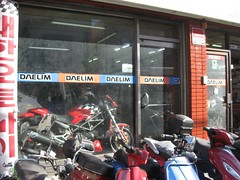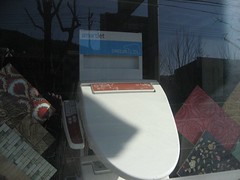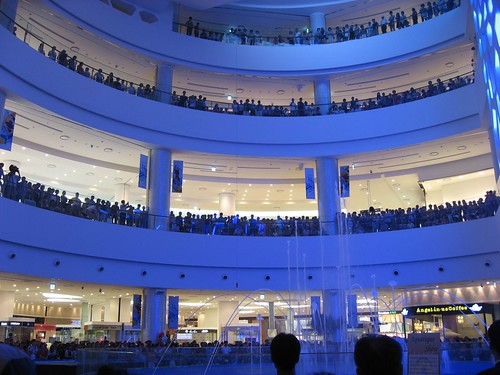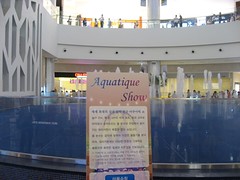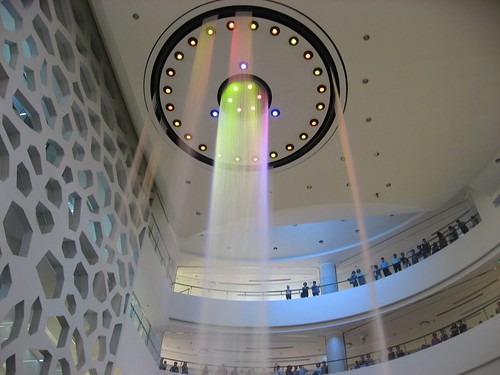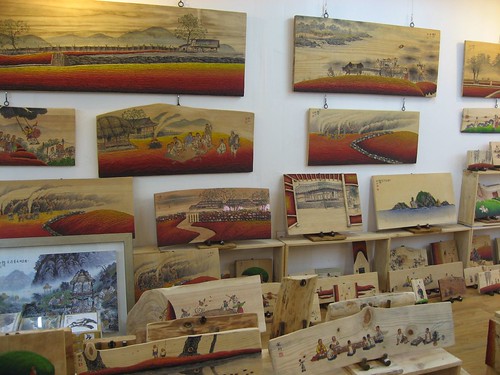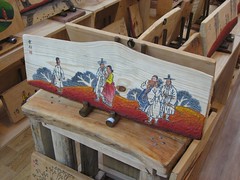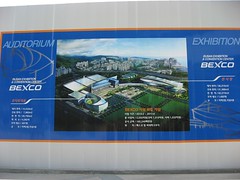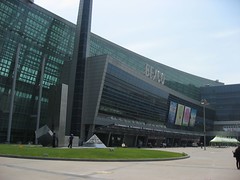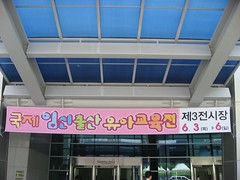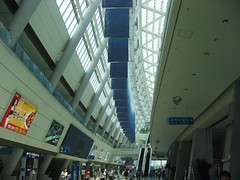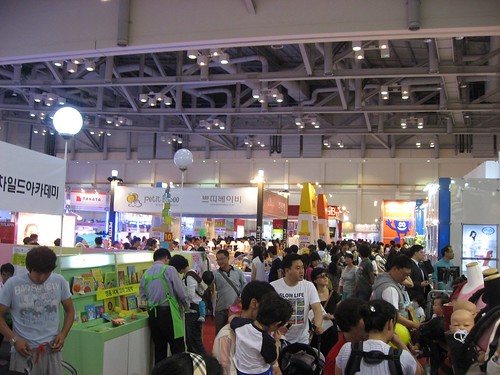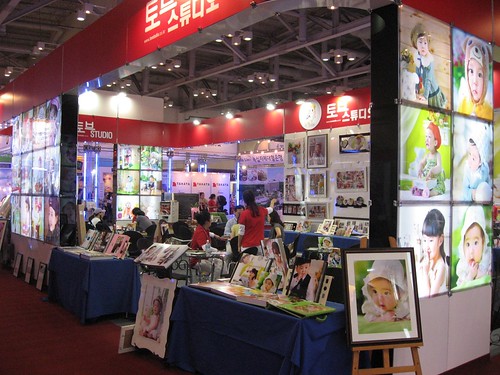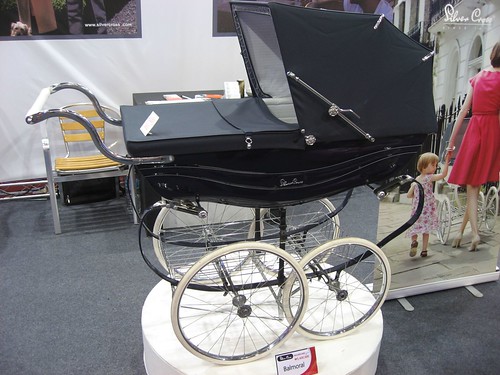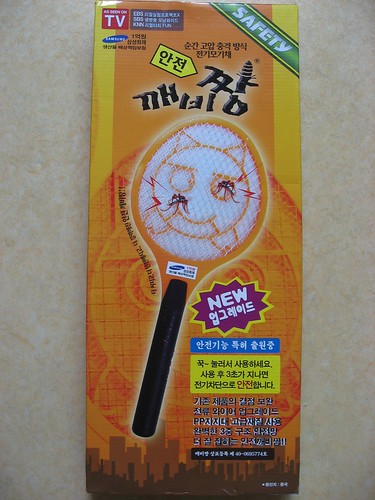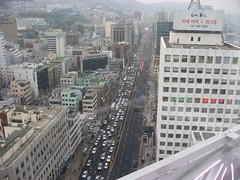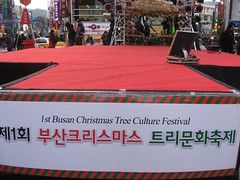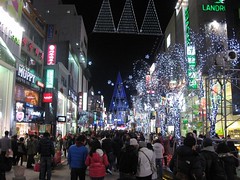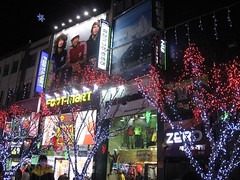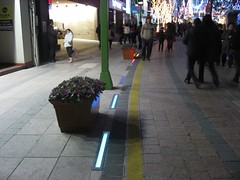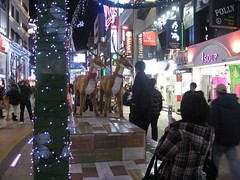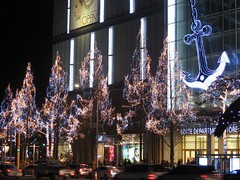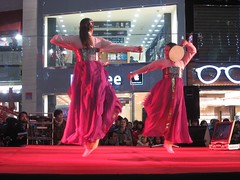Background
I think I mentioned LG and Samsung before on the show. In fact, it’s kind of hard to get through talking about life here without mentioning Korea’s ubiquitous [yes] brands. But this was the week I was told not to mention them – not even the foreign ones - even though this week’s subject was shopping - 20 minutes before I went on air.
One of the K-satire sites seems to have re-branded LG aka ‘Lucky Goldstar’ as ‘Fortunate Quasar’, and I was sorely tempted to go through the entire show calling them that, but 20 minutes is not enough time to think up alternate names for all the other chaebol, so the whole thing felt rather forced in the end for me. Well that’s live radio for you – next time I hope to be better prepared.
It’s fair enough that Busan e-FM doesn’t want to mention brands, but I have no such restriction here, so here it is, Week 18 – Uncut.
Introduction
So this week is about another very important aspect of life in Korea – shopping. I used to think we had quite a consumer-oriented culture in England, but it’s nothing compared to Korea.
The differences
There are a lot of differences between the UK and Korea when it comes to shopping. In the UK our shops are mainly in the city centres rather than everywhere you look, and we also have big ‘out of town’ retail centres – whereas here you don’t really have ‘out of town’ stores because there is no ‘out of town’ - everything is the town in a big city like Busan [seriously, it’s like Logan’s Run here]. And we have a lot of big brands in England, but here it often feels like a constant choice between LG and Samsung [or in the radio version – between a company beginning with ‘L’ and a company beginning with ‘S’ - see why it fell flat?]
I expected there to be a bigger variety of brands, and I actually thought there were at first, but then I found out that brands like Xcanvas, PAVV, Zippel and Hauzen belong to LG and Samsung. I suppose that’s the nature of the chaebol system, which of course we don’t have in England [unless you count the multi-branded tentacles of the government] – where almost all our products are made overseas anyway.
I found chaebol brands quite odd. For example, Daelim seem to make toilets and motorbikes. In England, the last car I owned was a Ford. But how would I have felt if my toilet was made by Ford as well? But I guess people here feel that the brand is more important than the object it’s attached to.
Purchases and consumer protection
In fact, the first thing I bought in Korea was a Korean keyboard for my laptop computer – it was made by a major Korean chaebol – but the quality was really poor. I admit, I realised later it was really cheap [I had no idea about the relative value of things here at first], but it made me think these companies will sometimes put their names on anything.
My experience with subsequent purchases has been mixed. My wife and I buy a lot of things from the Internet, but Internet shopping here is quite different. We have eBay in the UK, but most people choose to order from established online retailers like Amazon. Here, Gmarket and Auction – which are both owned by eBay – seem to be one of the main ways of buying online. So it feels riskier but from very small companies and individuals.
I also think we have much stricter consumer protection laws in the UK than the ones which exist in Korea. For example, we bought an aquarium online that was supposed to be 35cm deep, but it was shorter when we got it. The seller said it was because they had the wrong picture on their page, but they didn’t seem particularly sorry about it. Online prices are good though, so maybe you just have to take the risk.
Expensive item risk
But this means that it’s difficult to justify buying certain things online. When we bought a TV, the prices were much cheaper on the Internet, but we felt we couldn’t risk buying such an expensive item that way, so we bought it from Tesco Homeplus [declaration – I’m a shareholder] in the end. It’s the same with the DSLR I bought – I got it from Hi-Mart because it seemed too risky online. That’s different to the UK where you have big online companies that you can trust. And of course, it’s also difficult for me to shop online, because I don’t understand Korean.
Online and offline shopping
There are good things about shopping online. I love how deliveries are so fast compared to England, and you get these text messages telling you about when things have been dispatched – it’s really efficient. It’s just a pity I can’t browse through the Korean Internet to shop for things. That said, I’m not one of those foreigners who seems to think that Korean shopping sites should be available in English as well. I think if you want to shop in English, go home – this is Korea. If I can’t use Korean Internet sites, that’s my problem, not Korean people’s. I have to work on my Korean language skills.
So I find myself shopping offline a lot. Buying things from local shops here is also quite different from the experience in England – the opening hours are much longer here for one thing, and there’s an assumption that everything will be delivered, whereas in England you normally have to work that out yourself. Plus, if something needs installing, that will be done for you here as part of the service, even if it’s just a small aquarium from a local store.
The customer service is almost too good sometimes. For example, I bought a printer from a store, and because we lived around the corner and didn’t have a car, one of the staff insisted on carrying it to our apartment – which was a bit embarrassing [still, thanks Hi-Mart]. But on the other hand I find all the special cards which exist rather confusing - my wife has a special card holder just for all the extra points cards she carries.
The price is right
And prices are confusing, because I often can’t really work out what the prices in stores are supposed to be. This is partly because I have to convert them into my own currency to work them out, and partly because the ticket prices and the real prices are sometimes two entirely different things.
For example, when we were shopping for a TV, it became quite common for us to walk into a store, and immediately be offered 30% off the price of a TV we were looking at – and that’s before trying to haggle. In England, haggling isn’t as common, and you might get 5 or 10% off, but here we can haggle a price down 40% sometimes.
Ajumma rental servicet
Actually, my mother-in-law’s haggling skills are legendary – so we always take her with us when buying something expensive. She saves us a lot of money. Once we got a couch so cheap through haggling that when she told the store owner we’d come back later to buy bookcases, he actually said “Please don’t!” - and from the pained look on his face I think he really meant it too. [Shortly afterwards he moved his business away from our district shortly afterwards and in my mind it was just to avoid her].
What else you can’t buy here - drugs
There are things you can’t buy in Korea that I wish I could. I used to take drugs [no, not that kind] to control my Meniere’s Disease in England, but when I came to Korea I discovered that they aren’t available here, and there isn’t any alternative. That’s a huge problem for me, and I was really worried when my pills ran out.
I started taking various vitamins and herbal supplements instead - because some people believe they help – but the cost can be very high here. You can get them a bit cheaper online, but I don’t really want to buy vitamins from individuals on auction websites. And some items just aren’t available, so I have to import them from the U.S.
Free trade and other myths
Importing things into Korea from overseas really isn’t easy. With vitamins for example, you can only import a maximum of six items – not more than two of one item within that six – and the customs limit is around $130, including the postage, which is usually $40. So in other words, the postage is around a third of the whole cost. And yet... often buying things this way is still cheaper than the prices in Korea, which makes me think that Korean prices are a rip-off. That’s really unfortunate because people have a right to their health, and somehow – because of the way the market is here – Korean people are potentially suffering.
So there’s no easy solution to my vitamin problem. In fact – my wife and I even looked at setting up our own company just to import vitamins for our own use, but the rules are horrendous. It’s a shame, because there’s a famous cosmetic product in England for example, that I think Koreans would love if they could get it here [it’s Boots’ – ‘No. 7’ brand]. Sometimes locally-made products are not always the best choices, and they shouldn’t be the only choices.
But I’m hopeful that the free trade agreements Korea’s signed recently with the U.S. and E.U. might change things.
Links
Busan e-FM
Inside Out Busan
Air date: 2011-02-23 @ ~19:30
